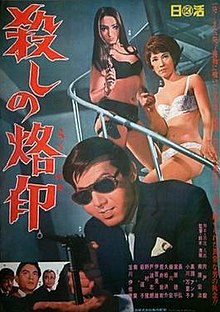Branded to Kill
| Branded to Kill | |
|---|---|

Original Japanese theatrical poster
|
|
| Directed by | Seijun Suzuki |
| Produced by | Kaneo Iwai |
| Written by | Hachiro Guryu |
| Starring |
|
| Music by | Naozumi Yamamoto |
| Cinematography | Kazue Nagatsuka |
| Edited by | Mutsuo Tanji |
| Distributed by | Nikkatsu |
|
Release date
|
June 15, 1967 |
|
Running time
|
98 minutes |
| Country | Japan |
| Language | Japanese |
| Budget | JPY 20 million |
| Branded to Kill | |
|---|---|
 |
|
| Soundtrack album by Naozumi Yamamoto | |
| Released | February 23, 2007 |
| Genre | Soundtrack, Jazz |
| Label | Think |
Branded to Kill (殺しの烙印 Koroshi no rakuin?) is a 1967 Japanese yakuza film directed by Seijun Suzuki and starring Joe Shishido, Koji Nanbara and Annu Mari. It was a low budget, production line number for the Nikkatsu Company, originally released in a double bill with Shōgorō Nishimura's Burning Nature. The story follows Goro Hanada in his life as a contract killer. He falls in love with a woman named Misako, who recruits him for a seemingly impossible mission. When the mission fails, he becomes hunted by the phantom Number One Killer, whose methods threaten his sanity as much as his life.
The studio was unhappy with the original script and called in Suzuki to rewrite and direct it at the last minute. Suzuki came up with many of his ideas the night before or on the set while filming, and welcomed ideas from his collaborators. He gave the film a satirical, anarchic and visually eclectic bent which the studio had previously warned him away from. It was a commercial and critical disappointment and Suzuki was ostensibly fired for making "movies that make no sense and no money". Suzuki successfully sued Nikkatsu with support from student groups, like-minded filmmakers and the general public and caused a major controversy through the Japanese film industry. Suzuki was blacklisted and did not make another feature film for 10 years but became a counterculture hero.
The film grew a strong following, which expanded overseas in the 1980s, and has established itself as a cult classic. Film critics and enthusiasts now regard it as an absurdist masterpiece. It has been cited as an influence by filmmakers such as Jim Jarmusch, John Woo, Chan-wook Park and Quentin Tarantino, and composer John Zorn. Thirty-four years after Branded to Kill, Suzuki filmed Pistol Opera (2001) with Nikkatsu, a loose sequel to the former. The company has also hosted two major retrospectives spotlighting his career.
...
Wikipedia
